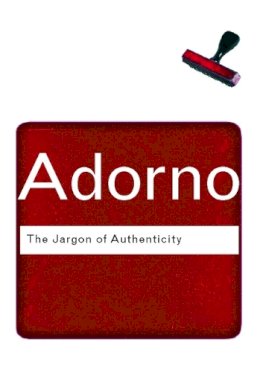
Stock image for illustration purposes only - book cover, edition or condition may vary.
The Jargon of Authenticity
Theodor W. Adorno
€ 18.33
FREE Delivery in Ireland
Description for The Jargon of Authenticity
Paperback. Adorno's frank and open challenge to directness, and the avoidance of language that 'gives itself over either to the market, to balderdash, or to the predominating vulgarity', is as timely today as it ever has been. Series: Routledge Classics. Num Pages: 176 pages, black & white illustrations. BIC Classification: HPCF3. Category: (P) Professional & Vocational; (UP) Postgraduate, Research & Scholarly; (UU) Undergraduate. Dimension: 202 x 129 x 15. Weight in Grams: 200.
Theodor Adorno was no stranger to controversy. In The Jargon of Authenticity he gives full expression to his hostility to the language employed by certain existentialist thinkers such as Martin Heidegger. With his customary alertness to the uses and abuses of language, he calls into question the jargon, or 'aura', as his colleague Walter Benjamin described it, which clouded existentialists' thought. He argued that its use undermined the very message for meaning and liberation that it sought to make authentic. Moreover, such language - claiming to address the issue of freedom - signally failed to reveal the lack of freedom ... Read more
Show LessProduct Details
Publisher
Taylor & Francis Ltd United Kingdom
Number of pages
176
Format
Paperback
Publication date
2002
Series
Routledge Classics
Condition
New
Number of Pages
176
Place of Publication
London, United Kingdom
ISBN
9780415289917
SKU
V9780415289917
Shipping Time
Usually ships in 4 to 8 working days
Ref
99-2
About Theodor W. Adorno
Theodor Adorno (1903 - 1969). German philosopher who was a leading member of the Frankfurt School. Adorno led an influential attack on the "culture industry" prevalent in contemporary capitalist society.
Reviews for The Jargon of Authenticity
'Adorno is a political thinker who wished to bring about radical change.' - Iris Murdoch 'A volume of Adorno's essays is equivalent to a whole shelf of books on literature.' - Susan Sontag 'Adorno expounds what may be called a new philosophy of consciousness. His philosophy lives, dangerously but also fruitfully, in proximity to an ascetic puritanical moral ... Read more
